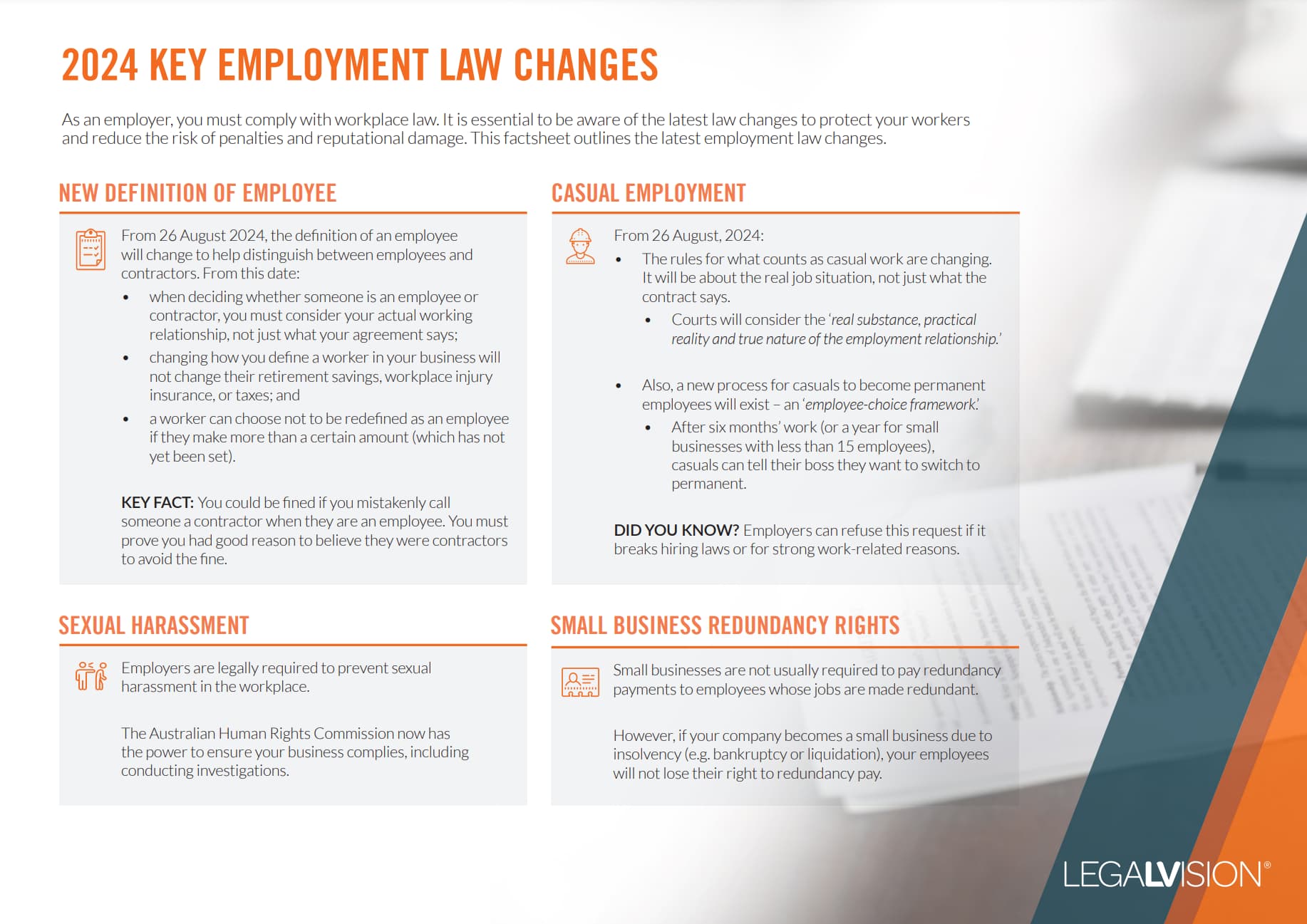Smartphones allow us to connect with each other more quickly and easily than ever before. Although you may welcome this convenience of connectivity in your social life, what about your work life? New digital technologies are blurring the lines between professional and personal spaces, and employees are consequently experiencing higher levels of stress. Several governments and individual companies have implemented guidelines to help combat the growing ‘always on’ work culture. Most recently, the Fair Work Act 2009 (‘the Act’) was amended to expressly include a right for Australian workers to disconnect from work. This article explains what these amendments mean and the new obligations they create for you as an employer.
What is the ‘Right to Disconnect’?
The Fair Work Legislation Amendment (Closing Loopholes No. 2) Act 2024 has introduced the concept of the ‘right to disconnect’ into the Australian employment law framework. The amended legislation entitles your employees to refuse to monitor, read or respond to contact from you or any work-related third party outside of their working hours. This applies unless their refusal is unreasonable.
When determining whether a refusal is unreasonable, you should take into account:
- the reason for your contact or attempted contact;
- how you made the contact, and the level of disruption this causes to your employee;
- the extent to which your employee is compensated, including non-monetary compensation, to remain available to be contacted and to work additional hours;
- the nature of your employee’s role and level of responsibility; and
- their personal circumstances, including any family or carer responsibilities.
Where an employee refuses to monitor, read or respond to contact, they are exercising their workplace rights under the Act. This means that the Fair Work Commission (FWC) or a court will protect your employee in the instance that you take adverse action against them.
The amendment will come into place on 26 August 2024, and therefore, you should familiarise yourself with your new obligations before then. While you will not face financial penalties if you decide to contact your employees outside of work hours, the FWC may order you to cease unreasonable contact.

As an employer, it is essential to understand what employment laws have changed and their implications for your business — particularly the changes to the Fair Work Act 2009 through the new Closing the Loopholes legislation.
What Does ‘Reasonable Additional Hours’ Mean?
Under Australian law, the standard full-time working week is 38 hours unless your employment agreements state otherwise. However, as an employer, you have the right to require employees to work ‘reasonable additional hours’. Examples of this include an employee:
- staying back at work to complete a project for a deadline; or
- working an extra hour at the end of the day to ‘close up’.
Whether or not you are required to pay for these additional hours is entirely dependent on whether your employees are covered by a modern award and the extent to which they are paid above the corresponding minimum rate of pay.
What Makes Additional Hours ‘Reasonable’?
The FWC or a court will consider the additional factors. They will consider subjective factors such as:
- the level of remuneration that your employee receives;
- any notice that you provide for the additional time required;
- health and safety issues and risks associated with the overtime;
- the employee’s personal circumstances;
- whether the employee has notified you that they cannot work overtime; and
- normal hours and expectations for contact in your particular industry.
There is a clear overlap between the considerations for whether performing additional hours and contact outside core working hours is reasonable. Reasonable additional hours typically relate to an employee extending their ordinary hours in accordance with their workload. However, unreasonable contact would involve you contacting an employee completely outside of their working hours, such as on the weekend, or expecting them to carry out additional work, such as reviewing their emails.
Ultimately, this amended legislation reflects the value Australian workers place on their ability to ‘switch off’ from work following the impacts of remote working.
Continue reading this article below the formCall 1300 544 755 for urgent assistance.
Otherwise, complete this form, and we will contact you within one business day.
Key Takeaways
Work-related stress and burnout are on the rise, in part due to digital technology. However, government bodies and companies are taking note of the trend and taking steps to limit the negative effects.
As an employer, you will need to reflect on current work practices and whether you are unreasonably requiring employees to be ‘always on’ and available outside of their contracted working hours. Additionally, if you are contacting employees outside of their working hours, you will need to ensure that they are sufficiently compensated.
If you require more information about your employer obligations, our experienced employment lawyers can assist as part of our LegalVision membership. For a low monthly fee, you will have unlimited access to lawyers to answer your questions and draft and review your documents. Call us today on 1800 532 904 or visit our membership page.
We appreciate your feedback – your submission has been successfully received.












